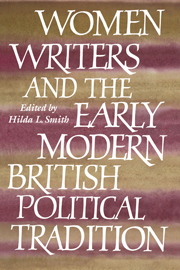Book contents
- Frontmatter
- Contents
- List of contributors
- Preface
- Introduction: Women, intellect, and politics: their intersection in seventeenth-century England
- Part I Women's political writings, 1400–1690
- Part II Women's political and philosophical writings, 1690–1800
- Part III The intellectual context and economic setting for early modern women
- Part IV Early modern legal and political prescriptions for women
- Introduction to Part IV
- 13 The politics of identity and monarchic government in France: the debate over female exclusion
- 14 The Holy Roman Empire: women and politics beyond liberalism, individual rights, and revolutionary theory
- 15 Women as sextons and electors: King's Bench and precedents for women's citizenship
- 16 “To be some body”: married women and The Hardships of the English Laws
- Conclusion: women's writing, women's standing: theory and politics in the early modern period
- Index
15 - Women as sextons and electors: King's Bench and precedents for women's citizenship
from Part IV - Early modern legal and political prescriptions for women
Published online by Cambridge University Press: 04 August 2010
- Frontmatter
- Contents
- List of contributors
- Preface
- Introduction: Women, intellect, and politics: their intersection in seventeenth-century England
- Part I Women's political writings, 1400–1690
- Part II Women's political and philosophical writings, 1690–1800
- Part III The intellectual context and economic setting for early modern women
- Part IV Early modern legal and political prescriptions for women
- Introduction to Part IV
- 13 The politics of identity and monarchic government in France: the debate over female exclusion
- 14 The Holy Roman Empire: women and politics beyond liberalism, individual rights, and revolutionary theory
- 15 Women as sextons and electors: King's Bench and precedents for women's citizenship
- 16 “To be some body”: married women and The Hardships of the English Laws
- Conclusion: women's writing, women's standing: theory and politics in the early modern period
- Index
Summary
In January, 1738/9, the Court of King's Bench took up a case, Olive v. Ingram, that seemed legally and politically insignificant. It involved a dispute between two claimants for the post of sexton in the London parish of St. Botolphs without Bishopsgate, and the amount in dispute was just five shillings. Yet the court continued the case for five months and held three separate sessions concerning its resolution. The facts of the case involved a woman who had been elected sexton through the support of women members of the congregation; five of their votes were necessary for her victory. King's Bench thus confronted two separate but related issues: could a woman occupy this minor church office, and could other women vote for her to do so?
The office of sexton had been held by Robert Bly, and upon his death, his widow Sarah Bly and a male rival, John Olive, competed for the post. A popular abridgement of English law describes the contest thus:
Two candidates offered themselves to be elected … viz. the widow of the sexton deceased, and the plaintiff: that upon casting up the books the plaintiff appeared to have a majority of male votes, but that afterwards, the widow polled 40 women, and then she had the majority; that the widow, and all the female voters were house-keepers paying scot and lot, and to all parish rates and assessments.
- Type
- Chapter
- Information
- Women Writers and the Early Modern British Political Tradition , pp. 324 - 342Publisher: Cambridge University PressPrint publication year: 1998
- 4
- Cited by

